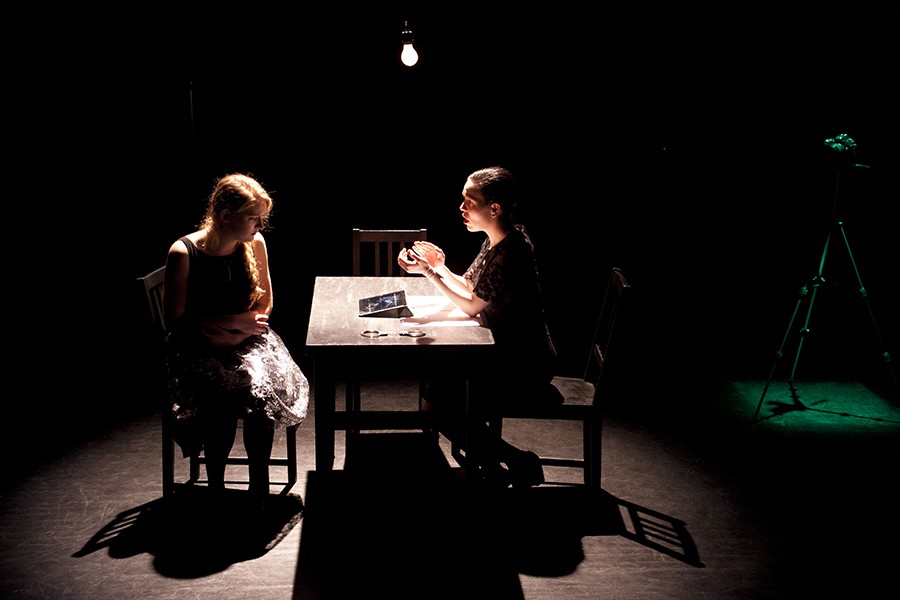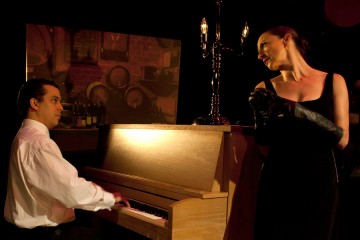When the lights come on, one woman sits handcuffed in a chair and another stands forbiddingly behind her, back turned to the audience. A table and two chairs sit between them. Little else decorates the stage—a camera on a tripod, a series of mirrors flank the stage's wings—and a pair of musicians stands at the rear.
The bassist, Alexander Fournier, bows a series of shivering notes while the trumpeter, Nicolas Sarbanes, gently blows a series of creepy textures from his instrument. Soon the musicians establish a mysterious groove, establishing the tone and texture for the one-act play that follows. The mood is a shadowy noir, the two women are enigmatic figures, and before the play's roughly one-hour running time expires, one of them will confess to the murder that brought them together in this interrogation room.
Framed Illusion is the final play in a trilogy exploring language, improvisation, and creativity that was written, conceived, and produced by Monica López-González, a Johns Hopkins alumna and Peabody at Homewood faculty member. Trained as a cognitive neuroscientist, López-Gonzalez specifically explores the neuroscience of creativity. The plays, films, and photography she creates fuse art and scientific research and experiments to explore the brain's decision-making process.
Like her previous plays Ultima Partida (The Final Draw) and In Session, López-Gonzalez uses the stage as a laboratory: musicians Fournier and Sarbanes improvise the score for each performance, responding to the actors and the lines of dialog. Fournier and Sarbanes have certain cues when they know where to enter and what the dramatic content of a scene is, but what they end up playing is different every night. In an interview about the play with Tom Hall on WYPR, López-González said she's "very fascinated to see how different languages work with improvised music."
Framed Illusion, however, represents a marked jump in the overall theatricality of her productions. As intellectually rich as both Partida and Session were, they each felt at times more like robust cognitive thought experiments than dramatic performance. These are plays admittedly conceived to explore some aspect of the human brain, but onstage they occasionally felt as if they never left the brain to wrestle with the interpersonal messiness that is human interaction.
With Framed Illusion, López-González leaps right into the chaotic whorl that is human emotion and stays there. Both the handcuffed suspect (Linda Bancroft) and the questioning detective (López-González) have come to the interrogation room from a posh book release party. The ostensible author of the book, an important if infamous man, is the murder victim. The suspect is the hired ghostwriter of his book. And the detective brazenly assumes the suspect killed him for any number of the transgressions men of power assume they can perpetrate against the women who work for them.
Throughout their interrogation, Bancroft and López-González exchange lines with an impassioned energy, and Fournier and Sarbanes musically mimic, comment on, and interact with them. It helps that film noir, which López-González echoes stylistically with this play, is a genre rich with musical vocabulary, and the dazzling musicality during the play's tense exchanges feels familiar. When the suspect begins to turn the tables on the detective about halfway through the play, the music zigzags with the change in roles, tone, and character temperament. Imagine the film My Dinner With André turned into a philosophical reflection on the nature of crime paired with an enervating jazz score.
As both the scientific and artistic director of her La Petite Noiseuse Productions that stages her plays, López-González records all the performances to study how musical elements—such as tone, tempo, and rhythm—interact with drama's emotional turns. Her previous research led to the paper "Cognitive Psychology Meets Art: Exploring Creativity, Language, and Emotion Through Live Musical Improvisation in Film and Theatre", and it'll be interesting to see what this play trilogy reveals to her—both in terms of how music and language interact, and for her interdisciplinary approach to studying the neuroscience of creativity.
Framed Illusion runs June 17 and June 18 at the Cabaret at Germanos.
Posted in Arts+Culture










